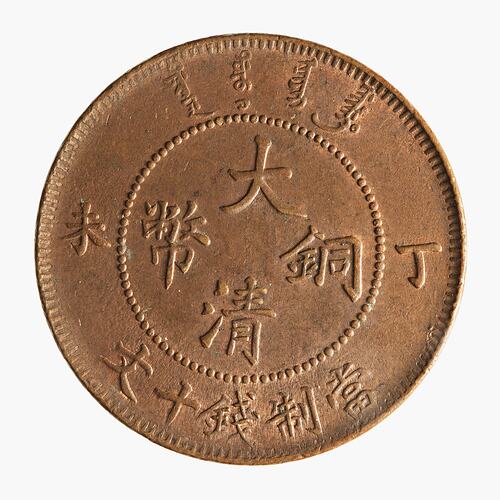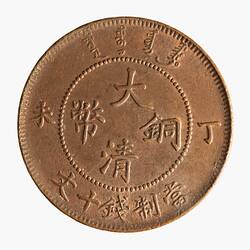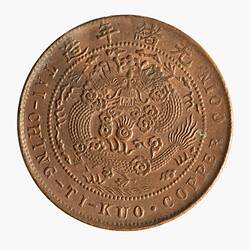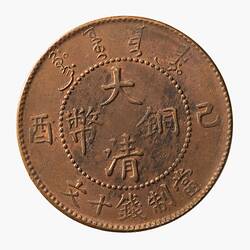Summary
Bronze 10 Cash coin issued by Emperor Kuang-hsu, Chinese Empire, 1907
Obverse Description
A dragon facing; around above, legend in Chinese; around below, TAI-CHING-TI-KUO COPPER COIN.
Reverse Description
Four Chinese characters within a central circle; around, legends in Chinese and Manchu characters; the Cyclical Date, 1907, is given by the characters on the left and right sides of the coin
Edge Description
plain
Significance
On 22 August 1905 the Emperor approved a regulation that would establish a central mint at Tientsin (now Tianjin) with four branch mints at Nanking (now Nanjing), Tientsin, Wuchang and Canton (now Guangzhou). All die production was centered at Tiensin. This coin was struck in the new Board of Revenue style which resulted from the Imperial regulation. Under this regulation the new bronze coins were to be 95% copper and 5% zinc (with the option of 1% tin to be added if desired). Early strikings were of low copper content though by 1905 a 95% standard was being achieved. The metal content of the new coins were only worth under half their face value but were forced into circulation. The number produced and the fact that they were not recieved in payment of taxes or government revenue saw them heavily discounted in circulation even though official banks were to watch money-changers and markets, with any attempt to raise or lower the value of the coins to be reported to the Board of Revenue or Provincial authorities. Reference: Royal Mint Annual Report 1906, pp.26-28
More Information
-
Collecting Areas
-
Acquisition Information
Donation from Mr John P. Sharples - Museum Victoria, 24 Aug 1995
-
Date Issued
1907 AD
-
Issued By
-
Denomination
-
Material
Bronze
-
Axis
12
-
Classification
-
Category
-
Discipline
-
Type of item
-
Dimensions
28 mm (Outside Diameter), 6.75 g (Weight)
-
Shape
Round
-
References
Y#10
[Book] Bruce, Colin R. 2009. 2009 Standard Catalogue of World Coins 1901 - 2000., 391 Pages



